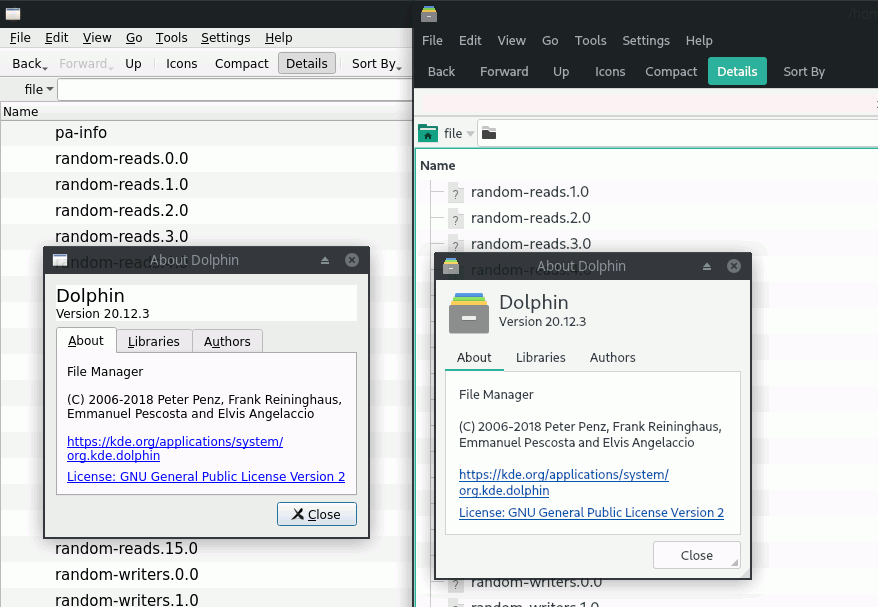I suspect you have Clementine using an ALSA device exclusively
so Audacious is not able to use the same device
and VLC cannot access the device via ALSA ‘default’ (PulseAudio) for the same reason
During the issue, i tried to close Clementine and open the VLC to play but it not helped.
$ systemctl restart pulseaudio.service
Failed to restart pulseaudio.service: Unit pulseaudio.service not found.
$ systemctl list-units --all|grep -i alsa
alsa-restore.service loaded inactive dead Save/Restore Sound Card State
alsa-state.service loaded inactive dead Manage Sound Card State (restore and store)
$ sudo alsactl nrestore
alsactl: load_state:1683: Cannot open /var/lib/alsa/asound.state for reading: No such file or directory
alsa-lib parser.c:260:(error_node) UCM is not supported for this HDA model (HDA Intel HDMI at 0xf3610000 irq 52)
alsa-lib main.c:1014:(snd_use_case_mgr_open) error: failed to import hw:0 use case configuration -6
Found hardware: "HDA-Intel" "Intel Haswell HDMI" "HDA:number1,number2,number3" "0x17aa" "0x3978"
Hardware is initialized using a generic method
alsa-lib parser.c:260:(error_node) UCM is not supported for this HDA model (HDA Intel PCH at 0xf3614000 irq 51)
alsa-lib main.c:1014:(snd_use_case_mgr_open) error: failed to import hw:1 use case configuration -6
Found hardware: "HDA-Intel" "Realtek ALC233" "HDA:string1,string2,string3" "0x17aa" "0x3978"
Hardware is initialized using a generic method
so audio is working (maybe due to me setting the device in mentioned file /etc/asound.conf)
so i tried to again empty that conf file and stop alsa:
$ > /etc/asound.conf;systemctl --user stop pulseaudio.socket;systemctl --user stop pulseaudio.service
audio is not playing and VLC again shows the bunch of Audio devices where the default selected is:
Default ALSA output (currently pulseaudio sound server)
when i switch to:
HDA Intel PCH, ALC233 Analog default audio device
audio start playing, but on file reopen it is reseted back to non playing: Default ALSA output
so i again set the device in conf file (1 is my internal sound card as described in my previous post):
$ cd;echo -e "defaults.pcm.card 1\ndefaults.ctl.card 1" > asound.conf;sudo mv asound.conf /etc/;cd -
and instantly without service restart i hear audio started playing in my VLC player. On VLC restart i see it shows bunch of audio devices where ALSA is default and plaiyng.
Then i do:
$ systemctl --user restart pulseaudio.socket;systemctl --user restart pulseaudio.service
Job for pulseaudio.service failed because the control process exited with error code.
See “systemctl --user status pulseaudio.service” and “journalctl --user -xe” for details.
$ systemctl --user status pulseaudio.service
● pulseaudio.service - Sound Service
Loaded: loaded (/usr/lib/systemd/user/pulseaudio.service; disabled; vendor preset: enabled)
Active: failed (Result: exit-code) since Fri 2021-01-08 14:13:18; 5s ago
TriggeredBy: ● pulseaudio.socket
Process: 361295 ExecStart=/usr/bin/pulseaudio --daemonize=no --log-target=journal (code=exited, status=1/FAILURE)
Main PID: 361295 (code=exited, status=1/FAILURE)
led 08 14:13:17 myusername systemd[778]: Failed to start Sound Service.
led 08 14:13:18 myusername systemd[778]: pulseaudio.service: Scheduled restart job, restart counter is at 5.
led 08 14:13:18 myusername systemd[778]: Stopped Sound Service.
led 08 14:13:18 myusername systemd[778]: pulseaudio.service: Start request repeated too quickly.
led 08 14:13:18 myusername systemd[778]: pulseaudio.service: Failed with result 'exit-code'.
led 08 14:13:18 myusername systemd[778]: Failed to start Sound Service.
Then i do:
pulseaudio -k; pulseaudio --start
and VLC start showing only one, working device: Built-In Audio Analog Stereo
so i think something is wrong with how is defined my audio device in Manjaro (since it needed me to manually define it in .conf file)? Do you have ideas to find the cause or get more details?
